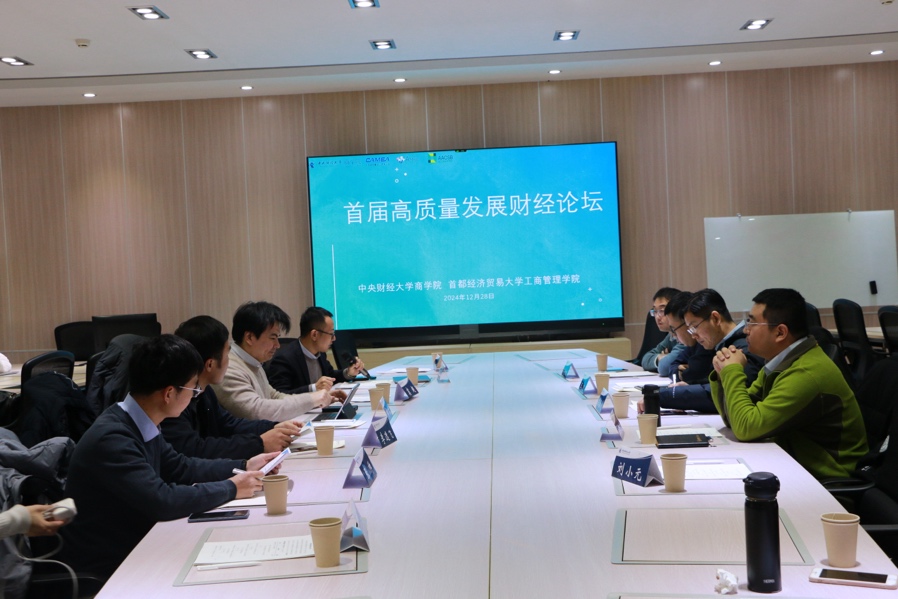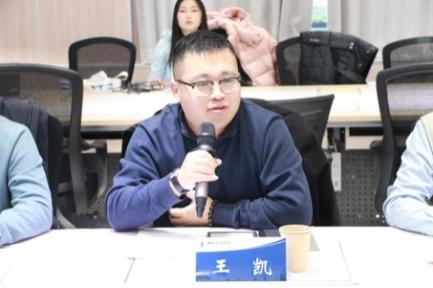On December 28, 2024, the inaugural High-Quality Development Finance and Economics Forum was successfully held at the CUFE MBA Education Center. This forum was jointly organized by CUFE Business School and the School of Business Administration of Capital University of Economics and Business. Young scholars from both universities engaged in in-depth discussions on hot topics such as China’s ESG practices, entrepreneurial behavior, U.S.-China trade friction and corporate responses, and supply chain finance, aiming to promote academic exchanges in the field of business administration and jointly contribute to high-quality economic development. Over 30 faculty members and students from CUFE Business School and the School of Business Administration of Capital University of Economics and Business attended the forum. Professor Zhang Guangli, Director of the Department of Finance and Financial Management at CUFE Business School, presided over the event.

At the opening of the forum, Professor Lin Song, Dean of CUFE Business School and Director of the MBA Education Center, delivered a welcome speech. He emphasized that the joint hosting of this forum by CUFE and Capital University of Economics and Business held extraordinary significance, providing a high-quality and efficient communication platform for faculty and students from both institutions. He stated that future inter-university exchanges should be strengthened to foster mutual learning and collaboration. He remarked that today’s forum marked an excellent beginning and expressed hope that such events would continue to enhance inter-university cooperation, contributing more intellectual resources to high-quality economic development. Professor Wang Kai, Vice Dean of the School of Business Administration at Capital University of Economics and Business, noted in his speech that previous academic exchanges had mostly occurred within individual institutions, while opportunities for dialogue between similar finance and economics universities remained limited. He highlighted that this forum offered a valuable opportunity, with many young scholars actively participating to share their research findings and gain inspiration and experience through academic exchanges.


The discussion session of the forum was co-hosted by Zhang Guangli and Wang Kai, covering multiple hot topics closely aligned with critical issues in China’s current economic environment. Li Xiaohan, a doctoral student in Business Management at CUFE Business School, presented her paper Human Capital Mobility and Urban-Rural Income Gap. The study found that net inflows of regional human capital significantly narrow the urban-rural income gap, particularly in regions with higher social security expenditures, well-developed talent policies, and eastern China. Wang Kai presented the paper The Spillover Effects of Registration-Based IPO Reform on SME Innovation: A Shareholder Risk-Taking Perspective. By constructing a theoretical model of major shareholders’ innovation decision-making, the research revealed the intrinsic mechanisms through which registration-based reforms influence SME innovation via shareholder risk-taking channels.
Chen Jinliang presented Supply Chain Complexity and Corporate Access to Trade Credit: Proactive Strategy or Passive Consequence?. The study identified a U-shaped relationship between supply chain complexity and corporate access to trade credit, uncovering how horizontal and vertical supply chain complexities affect trade credit acquisition capabilities through corporate digital transformation. Sun Weizheng reported on the working paper Stock Liquidity and Corporate ESG Performance, focusing on how stock liquidity enhances corporate ESG performance. The results indicated that stock liquidity improves ESG performance by alleviating financing constraints and attracting long-term institutional investors. Dou Chao presented Sanction Shocks and Corporate Investment Efficiency: A Study Based on the U.S. Unilateral Sanctions List Against China, exploring the impact of U.S. sanctions on Chinese firms’ investment efficiency. The research found that sanction shocks compel firms to enhance R&D innovation capabilities and adopt prudent management strategies, thereby improving investment efficiency. Zhang Shuai reported on the paper Research on the Business Model Innovation Paths of Traditional Enterprises in Platform Ecosystems. Using a dual-case comparative design, the study examined the innovation paths of traditional enterprises in e-commerce platform ecosystems, proposing two complementary paths: value emergence and value traction.
Li Jiapeng shared the working paper Crisis-Driven Mechanisms of Business for Good: A Dual-Case Longitudinal Study. The research revealed two modes of crisis-driven prosocial transformation: decision-maker-driven and public-driven. While both modes ultimately diverge, they exert distinct impacts on corporate sustainable development. Wang Xingjian presented the paper The Corporate Governance Effects of Innovative Investor Protection Mechanisms: The Impact of Investor Service Center’s Rights Enforcement on Executive Incentives and Constraints. The study highlighted that the Investor Service Center’s rights enforcement not only significantly improves the sensitivity of executive turnover and compensation to performance but also enhances corporate governance through improved internal mechanisms and external regulatory pressure.
Participants engaged in lively discussions and exchanges on the presented papers, creating a vibrant academic atmosphere.
The successful hosting of the inaugural High-Quality Development Finance and Economics Forum marked a significant milestone for inter-university academic collaboration. Featuring outstanding empirical and case-based research aligned with real-world economic issues and the theme of high-quality development, the forum deepened academic understanding of China’s economic hot topics and laid a solid foundation for sustained future collaboration between institutions.